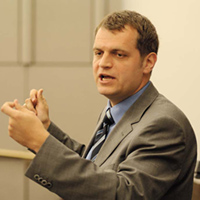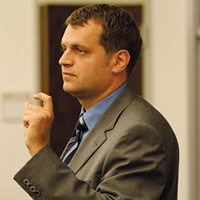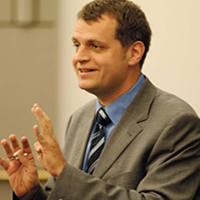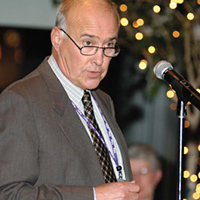 |
© Nathan Mandell |
Doing
well by doing good
New
Kellogg BASE major explores the social context of business
By
Ed Finkel
When Kellogg School
of Management Dean Dipak C. Jain and his faculty began thinking
through an ambitious new major focused on corporate social
responsibility in the spring of 2001, little did they know
what the subsequent year would bring.
With
the implosion of Enron and Arthur Andersen and the string
of accounting scandals that followed, the new Business
and its Social Environment (BASE) major, offered for the
first time this fall, arrives at an especially propitious
time. But Jain and others stress that both faculty research
and student interest in the subject of how corporations can
“do well by doing good” dates back a number of
years.
“This major
is going to be driven by faculty research,” Jain says.
“We do not view it as a flavor-of-the-day curriculum.
We earned a reputation because we anticipated the market’s
needs better and faster than our competitors. BASE represents
another example of our efforts to remain ahead of the curve
in leadership education.”
The new major
includes some courses that previously existed, such as Strategic
Management in Nonmarket Environments, and others that have
been newly created or substantially revamped, including Environmental
Management, Making Ethical Decisions and The Socially Responsible
Business. BASE is open immediately to second-year students,
and its individual courses — like any in Kellogg —
are open to nonmajors.
Mandy
Taft ’03, a second-year student who is president and
co-chair of Kellogg’s student Social
Impact Club, says she and many of her classmates see BASE
as a new way — beyond Kellogg’s existing nonprofit
management major — to apply business skills to social
issues such as human rights, labor and the environment.
“There’s
a unique set of issues that appear when you’re trying
to balance the corporate bottom line and the social bottom
line,” she says. “It’s new. There are not
a lot of people who do it. It’s wonderful to be on the
cutting edge of a new field and to have an opportunity to
develop the skills to be a leader in that area.”
| |
 |
| |
 |
| |
 |
| |
© Nathan Mandell
Professor
Daniel
Diermeier, BASE co-director, engages his
students in a discussion about strategic management
in nonmarket environments. |
| |
|
Ethics
as fiscal foundation
Faculty
do not expect the typical graduate to join a company’s
“corporate social responsibility department” per
se, but rather to become an executive who is better oriented
to these emerging issues, says David Messick, the Morris and
Alice Kaplan Professor of Ethics and Decision in Management,
and the academic co-director of the new major and director
of Kellogg’s
Ford Center for Global Citizenship.
“These
are all issues that somebody who’s going to be a successful
executive has to be conversant in and has to understand the
importance of,” says Messick, who has incorporated whistle-blowing
cases such as “Serpico” in his courses, as well
as books such as It’s No Accident and Serpent
of the Rock, exposés of lethal baby products and
Prudential’s fraudulent marketing of financial products.
“This major is going to be more important in the coming
century as fewer things are done by government agencies. People,
through a political process, are going to require business
to accept responsibilities that they hadn’t previously
thought of as their responsibilities,” he notes.
Josh Miller ’03,
a second-year student and BASE major, echoes others’
thoughts in saying that the major will provide a structure
for Kellogg’s teaching and research in the area of corporate
social responsibility.
“This major
is acknowledging that this topic isn’t just a passing
thought, but something you can spend your career thinking
about,” Miller says. “It’s legitimizing
an important set of skills for business people. More Kellogg
students will decide to pursue BASE, and it will put more
MBAs into the world who have thought about the issues of ethics
and social responsibility.”
The research
thrust behind the BASE major is not a pie-in-the-sky notion
that claims companies should care about workers, consumers,
the environment and other social concerns because it’s
merely a nice thing to do. Rather, faculty have been examining
“when the environment makes financial sense for a company
to try to differentiate itself from a competitor by being
socially responsible,” says Daniel Diermeier, IBM Professor
of Regulation and Competitive Practice, and academic co-director
of the new major.
Their
research has investigated questions such as whether it is
true that companies identified as socially responsible are
indeed more profitable, have a higher stock price, have cheaper
access to capital, are better at risk management and are better
companies to work for, notes Diermeier.
“That
means you look at this issue from the point of view of rigorous
management research,” he says. “We wanted to make
sure that ethics and issues of social responsibility are not
‘ghetto-ized’ and assume a kind of elective status,
in the sense that they are perceived as a luxury, or that
such considerations are only of interest for specialists.
We believe that the issues raised by BASE can become a central
focus of management thinking in general.”
This belief is
one that’s starting to gain wider and wider acceptance
among leadership educators and industry observers. Kellogg,
however, is the first school to launch a comprehensive major
in this area, rather than simply respond by adding a stand-alone
ethics class.
Balancing the relationships
between financial success and a progressive social agenda
can prove extremely complicated for businesses, especially
when the decisions corporate leaders must make end up being
more nuanced.
Progressive
businesses will lead the market
As an example,
Kellogg Professor Tim Feddersen has researched the subtleties
of how to deal with activist groups. His work has found that
in markets with tight competition for consumers and differing
degrees of social responsibility among companies, activists’
stamp of approval or disapproval can make a difference.
Feddersen,
the Wendell Hobbs Professor of Managerial Economics and Decision
Sciences, says firms need to be aware of the characteristics
of their products and markets that increase vulnerability
to activist action. “Firms need to think strategically
about how to respond to activist action and to recognize opportunities
to work with activist groups,” says Feddersen, who,
like Diermeier, teaches a BASE course on strategic management
in nonmarket environments.
 |
|
© Nathan Mandell
Professor David
Messick discusses the ethical obligations of executives
as corporations grow increasingly important politically.
Messick spoke at a recent Kellogg Alumni Advisory Board
dinner. |
|
| |
|
The consensus
among Kellogg faculty, students and alumni is that, in the
long run, businesses making progressive decisions about social
issues — even if that means going beyond what government
requires — will be the most successful.
“One
of the basic misconceptions that people have is that it’s
a tradeoff: either you do good business or you do good for
the community. The two are actually reinforcing,” says
Ivy Tseng ’01, who works in corporate marketing for
IBM in Armonk, N.Y. “Short term, you might spend a bit
more on your bottom line to make sure the products you manufacture
are not using dangerous chemicals. Long term, you don’t
have to worry about getting sued.”
She adds:
“As a purely payoff-oriented investor, I want to pick
a company that isn’t going to get sued tomorrow. That’s
going to be a company that cares about the environment and
their employees. One of my frustrations with businesspeople
in general is that they think it’s one or the other.
I’m glad that Kellogg has seen the light.”
Lawsuits
are but one of an array of potential concerns facing corporations
who continue with the old ways of doing business: Activist
boycotts of a company’s products, critical stories in
the press and greater government regulations all await those
who give social concerns short shrift, say Kellogg School
experts.
“What
is becoming more and more apparent is that you ignore those
influences at your peril,” says Erich Hoefer ’03,
a second-year student who is taking the core courses for BASE
and “strongly considering” it as a major. “I’m
developing the savvy and the toolbox to be a better manager,
as well as other opportunities to meet similarly minded people.
It’s context and contacts.”
When
assets become liabilities
Diermeier
cites Nike as an example of a company that met and even went
somewhat beyond just following the laws in its overseas factories
— but still faced activist boycotts and harmful media
coverage.
“As
a human-rights activist, if I want to change labor practices
in Thailand, I’m no longer going to protest in front
of the Thai embassy. That’s ’90s or ’80s
activism,” explains Diermeier. “What I’m
doing now is targeting and boycotting Nike, so that I can
use private practices as a transmission belt, so to speak,
to effect changes in developing countries. That’s much
more effective. It’s much quicker and just works better.”
And that
fact goes to the heart of what students will study, Diermeier
says. “What can be assets for a company — let’s
say their brand or their reputation — can be turned
into liabilities,” he says. “Not only do we have
to deal with private actors, like activists or the news media,
you also have to worry about legislators, regulators and exactly
what the incentives are to take action and how to manage them.
That’s a complex strategic problem. That’s a difficult
environment in which to be successful. And that’s what
our students are going to learn.”
These
students will have much to offer, since only a handful of
companies have moved boldly in a progressive direction, says
Samantha Levine ’02, who works for the Boston-based
Bridgespan Group, a nonprofit consulting firm.
“There
is a larger group of corporations that would like to move
in this direction, but they would like more guidance, or they
need someone to push them a bit, or they need some reassurance
that this will not hurt profitability,” Levine says.
“That’s where I think Kellogg grads can be most
effective — taking these skills and being that catalyst
for change within a company.”
One company
that many believe has sought such change is BP. The firm has
endeavored to position itself strategically as an energy company
— not a petroleum company.
“Their
big question is whether they would drill in the Arctic National
Wildlife Refuge” even if they could do so legally, Diermeier
says. Other questions for the company include devising investment
strategies, defining corporate culture and internal organization
and assessing marketing efficacy. “These considerations
go to the heart of everything BP does,” adds Diermeier.
“The firm is a big role model for many of the students.
They dream of working for BP. And there you go — that’s
another advantage conferred by serious consideration of the
social context of your business — it’s easier
for you to attract talent.”
Miller
agrees wholeheartedly. “People will start to learn that
it’s a competitive advantage to understand nonmarket
forces and the social environment, and they’re not going
to want to work for a company that doesn’t get it,”
he says, “because that corporate model will be less
sustainable."
|



